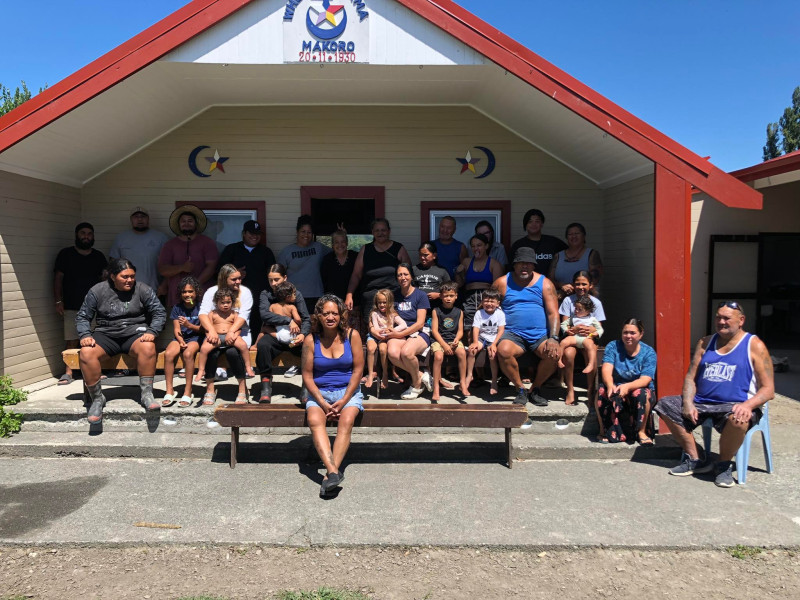Wairoa stands strong in wake of Cyclone Gabrielle
Wairoa stands strong in wake of Cyclone Gabrielle

(Picture caption: Whanau from Whetu Marama Makoro Marae at Frasertown, Wairoa reflect on the damage caused by Cyclone Gabrielle.)
Pouri (sad), heartbroken, devastated...this is how Austin King describes his hometown of Wairoa after Cyclone Gabrielle left it reeling in her wake.
Austin (Ngati Kahungunu ki Te Wairoa) is a Senior Advisor for the Ministry for Pacific Peoples’ Communications and Marketing team and hails from the Hawke’s Bay most northern town, with a population of just over 9,000 people.
The 30– year-old was at his Wairoa home with his mum, dad and niece when Cyclone Gabrielle reached the Hawke’s Bay area at the start of last week.
“Overnight Monday, my mum and I had a very restless night, because of the heavy rain and wind from the cyclone,” Austin says.
On Tuesday morning, he woke up before dawn and decided to go for a drive around town to see what damage the cyclone had caused and it was worse than he feared.
“We live right on the riverbend and when first light came over the river, it was dangerously high and close to our property.
“The debris and damage caused was incredible, many homes unsuitable to live in - so many people have been displaced from flooding and are now staying with friends or whanau.”
Austin says one of Wairoa’s main local marae Takitimu-Waihirere, which was opened by the late Māori King Koroki, has been swamped by floodwater.
“When I visited the marae on Thursday, the silt was up to above my ankles.
“We are isolated and our essential supplies are critically low or not working, and includes water, fuel, food and communication.
“This will go down as one of the most devastating natural weather events to affect our community and it is certainly worse than Cyclone Bola in 1988.”
North Clyde, a suburb in Wairoa, was the most severely affected neighbourhood and Austin says the amount of people whose homes have been flooded, caked by silt and damaged by large bits of debris absolutely saddens him.
“I've never seen in my entire life our neighbourhood streets just lined with damaged whiteware, mud-ridden couches and all sorts of other rubbish - it's quite a sight to see.”
Always one to seek the positive side of a challenging situation, Austin says he is just grateful his family is fine.
“We are just hoping to see some of the more essential supplies come to Wairoa as soon as possible - with the lack of communication, there is no Eftpos and the ATMs are down, so many families are having to seek assistance.
“Evacuation centres are currently housing many people, and there are people stuck outside of Wairoa desperately trying to get home to their families.
“Whanau all over the motu and the world are trying desperately to get in touch with their families to see if they are okay.”
The situation in Wairoa remains dire, but it is neat to see families, friends and neighbours banding together to help clean up, Austin says.
“Still, some have lost their homes and it's absolutely heartbreaking.”
Helpful information
If you need to leave your home consider staying with friends and family as a first option.
Civil Defence Centres (CDCs) and shelter sites are currently open across the North Island to provide shelter to families who need to leave their homes.
The Civil Defence website has useful information, and you can visit your regional Emergency Management website for information relating to your location:
- Northland Civil Defence
- Auckland Emergency Management
- Thames Coromandel District Council
- Waikato District Council
- Bay of Plenty Civil Defence
- Tairāwhiti Civil Defence
- Hawke’s Bay Civil Defence
- Tararua District Council Facebook page
Stay connected
Our main concern is ensuring our Pacific communities are connected, and informed about the support available to them, if required.
We have set up a dedicated MPP webpage with everything people need to know and links to services and support in the aftermath of both the recent floods and cyclone.
Key information has also been translated into our nine Pacific languages.
Visit the MPP website for more details.
- Emergency services – phone 111 if your life is in danger
- National Emergency Management Agency (NEMA) – response and recovery information
- Ministry for Pacific Peoples – information on the coordinated response to floods and the cyclone, including information in nine Pacific languages
- Get Ready - learn what to do before, during and after a storm
- Waka Kotahi – road closure information and other transport updates
- Ministry of Social Development – welfare information and support
- Fire and Emergency - tips during power outages
- Mental Health Foundation – list of helplines
- SPCA – assistance with animals
Ways to help
The Red Cross is asking people to donate money instead of goods or services, saying this was the best way to make sure local communities get help in the most effective way.
- Auckland City Mission- donations of food or money
- Auckland Council Emergency Relief Fund– donations of money
- HUHA- Text 4463 to help animals with an instant $3 donation
- Volunteering Hawke’s Bay, Volunteering Northland, Volunteering Bay of Plenty, Volunteering Aucklandor Volunteering Waikato to volunteer
- Student Volunteer Army– to help clean up
- Orange Sky- offers laundry and shower services and welcomes donations of toiletries
